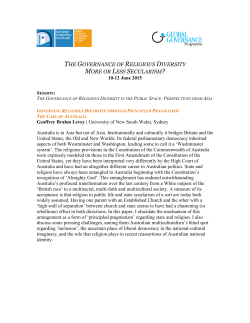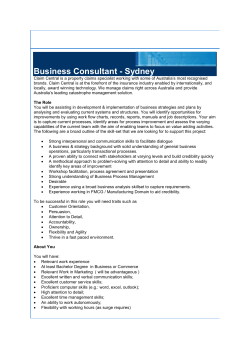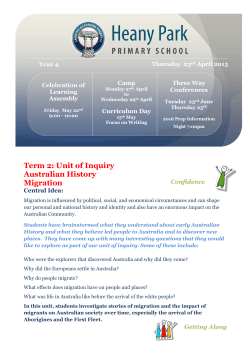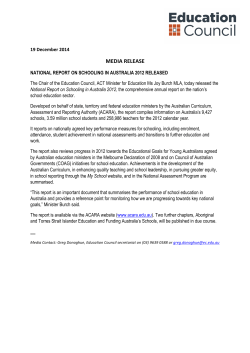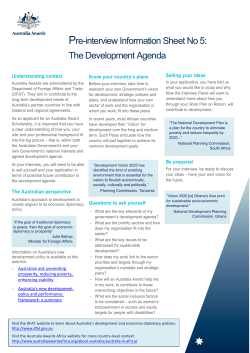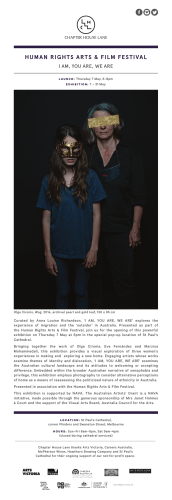
UNITED NATIONS HUMAN RIGHTS COUNCIL 23rd
UNITED NATIONS HUMAN RIGHTS COUNCIL 23rd Session of the Working Group on the Universal Periodic Review 2-13 November 2015 INTERNATIONAL COMMISSION OF JURISTS’ SUBMISSION TO THE UNIVERSAL PERIODIC REVIEW OF AUSTRALIA Submitted in March 2015 Composed of 60 eminent judges and lawyers from all regions of the world, the International Commission of Jurists promotes and protects human rights through the Rule of Law, by using its unique legal expertise to develop and strengthen national and international justice systems. Established in 1952 and active on the five continents, the ICJ aims to ensure the progressive development and effective implementation of international human rights and international humanitarian law; secure the realization of civil, cultural, economic, political and social rights; safeguard the separation of powers; and guarantee the independence of the judiciary and legal profession. P.O. Box, 91, Rue des Bains, 33 1211 Geneva 8, Switzerland Tel: +41(0) 22 979 3800 – Fax: +41(0) 22 979 3801 - Website: http://www.icj.org E-mail: [email protected] ICJ’s submission to the Universal Periodic Review of Australia ICJ’S SUBMISSION TO THE UNIVERSAL PERIODIC REVIEW OF AUSTRALIA 1. The International Commission of Jurists (ICJ) welcomes the opportunity to contribute to the Human Rights Council’s Universal Periodic Review (UPR) of Australia. In this submission, the ICJ brings to the attention of the Human Rights Council’s Working Group on the UPR and to that of the Human Rights Council (HRC) issues concerning: (i) the treatment of asylum-seekers and Australia’s attacks against international refugee law; (ii) the treatment of aboriginal and Torres Strait Islander peoples; (iii) the weakening and undermining of the Australian Human Rights Commission; and (iv) international instruments and mechanisms. The treatment of asylum-seekers and Australia’s attacks against international refugee law 2. Australia has taken a number of retrogressive steps in relation to protection of asylum-seekers and refugees, including: (i) the ongoing use of mandatory immigration detention; (ii) the transfer of asylum-seekers, including unaccompanied or separated asylum-seeking children, to third countries for the stated purpose of determining their claims to refugee status off-shore – referred to as off-shore processing of asylum claims; (iii) the ensuing indefinite arbitrary detention of asylum-seekers subject to off-shore processing of their claims; (iv) the detention conditions at off-shore facilities in Papua New Guinea and Nauru,1 for which Australia continues to bear a primary responsibility; (v) the ongoing practice of intercepting vessels with a view to interdicting their landing on Australia’s mainland shores; (vi) the detention of those onboard the intercepted vessels; (vii) attempts at removing those intercepted/rescued at sea to third countries, without consideration of Australia’s non-refoulement obligations; and (viii) attempts to remove and the removal of explicit references to the country’s non-refoulement obligations under the International Covenant on Civil and Political Rights (ICCPR), the Convention on the Rights of the Child (CRC), the Convention against Torture and Other Cruel, Inhuman or Degrading Treatment or Punishment, and the Convention Relating to the Status of Refugees from the Migration Act 1958. 3. In December 2014, the UN Committee against Torture (CAT) adopted a number of specific concluding observations about Australia’s policies and practices in regard to non-refoulement, mandatory immigration detention, including of children, and off-shore processing of asylum claims. It expressed profound concern about policies currently being applied under Australian laws and about new laws proposed by Australia in this context. (i) Regarding non-refoulement, the CAT expressed concern about Australia’s policy of intercepting and turning back boats without due consideration of Australia’s obligations under the Convention and at proposed amendments watering down the existing statutory standards in the Migration Act that would make it an officer’s duty to remove a person claiming refugee protection as soon as reasonably practicable, and irrespective of whether there has been an assessment according to law of Australia’s non-refoulement obligations under the Convention.2 (ii) Regarding mandatory immigration detention, including of children, the CAT expressed its ongoing concern that detention continued to be mandatory for all “unauthorized arrivals”, including for children, until 1 ICJ’s submission to the Universal Periodic Review of Australia (iii) that person is either granted a visa or is removed from the jurisdiction. Further, it expressed concern at the reportedly protracted periods of deprivation of liberty because Australian law does not establish a maximum length for holding people in immigration detention, and at the fact that stateless people whose asylum claims have been dismissed and refugees with an adverse security or character assessment could be detained indefinitely.3 Regarding off-shore processing of asylum claims, the CAT expressed concern at Australia’s policy of transferring asylum-seekers to the regional processing centres located in Papua New Guinea (Manus Island) and Nauru for determination of their protection claims, despite reports of harsh conditions prevailing in those centres, such as: • mandatory detention, including for children, • overcrowding, • inadequate health care, and • even allegations of sexual abuse and ill-treatment. 4. The CAT concluded that “[t]he combination of the harsh conditions, the protracted periods of closed detention and the uncertainty about the future reportedly creates serious physical and mental pain and suffering.” It reminded Australia that all persons who are “under the effective control” of Australia, because, inter alia, they had been transferred by Australia to centres run with its financial aid and with the involvement of private contractors of its choice, “enjoy the same protection from torture and illtreatment under the Convention”. 4 5. The above-mentioned practices, in addition to constituting grave violations of the human rights of refugees and asylum-seekers, constitute an assault on the international refugee protection system. They are also incompatible with the principle of legality,5 and contrary to obligations that Australia has undertaken by becoming a party to several international human rights treaties, including the ICCPR, the Convention against Torture and Other Cruel, Inhuman or Degrading Treatment or Punishment and the 1951 Convention relating to the Status of Refugees and its 1967 Protocol. The impact of mandatory sentencing on aboriginal and Torres Strait Islander peoples 6. Mandatory sentencing laws currently apply in Western Australia, the Northern Territory, New South Wales, Queensland, South Australia, Victoria and under Commonwealth laws concerning people smuggling. Since the 2011 UPR new mandatory sentencing legislation, in addition to already existing legislation, has been introduced in the Northern Territory, 6 New South Wales, 7 Queensland8 and Victoria.9 7. Mandatory sentencing laws are arbitrary and undermine fundamental principles of the rule of law and separation of powers because they prevent courts from imposing appropriate penalties based on the circumstances of each offence and offender. Moreover, they have a disproportionate effect on indigenous people and young. 8. The Law Council of Australia, the country’s lead national representative body for legal professionals, has described as a “national crisis” the fact that “[i]ndigenous youths are now locked-up at 24 times the rate of nonIndigenous youths and the incarceration rate for Indigenous women has increased by 74% since the year 2000”. It has expressed alarm that Australia’s Indigenous imprisonment rates have doubled since the time of the 1991 Royal Commission into Aboriginal Deaths in Custody and that despite that Commission’s recommendations to reduce the incarceration of Indigenous people “[n]ow, around 1 in 4 deaths in custody is Indigenous, up from 1 in 7 2 ICJ’s submission to the Universal Periodic Review of Australia at [that] time”. The Law Council considers that mandatory sentencing potentially results in harsh and disproportionate sentences where the punishment may not fit the crime.10 9. The National Congress of Australia’s First Peoples has concluded that the overrepresentation of Aboriginal and Torres Strait Islander people in the criminal justice system is the most serious way in which the justice system is failing Aboriginal and Torres Strait Islander people. 11 Aboriginal and Torres Strait Islander adults are incarcerated at 14 times the rate of non-Aboriginal and Torres Strait Islander adults,12 and Aboriginal and Torres Strait Islander young people are 24 times more likely to be in youth detention than non-Aboriginal and Torres Strait Islander young people. In 2013 indigenous prisoners represented 27 per cent of the prison population nationally, 86 per cent of the Northern Territory adult prisoner population and 40 per cent of the Western Australian prisoner population. 13 The most common offences in Western Australia and the Northern Territory carry mandatory sentences.14 10. While systemic social issues have been identified as contributing to the disproportionate presence of indigenous people in the criminal justice system, sentencing policies also play a significant role, particularly in states with high populations of indigenous people in which mandatory sentencing regimes apply, and individuals are often imprisoned for trivial offences.15 In December 2014 the CAT concluded the following about the plight of indigenous people in the criminal justice system: the Committee is concerned at information received that indigenous people continue to be disproportionately affected by incarceration, reportedly representing around 27 per cent of the total prisoner population while constituting between 2 and 3 per cent of the total population. In that respect, the Committee notes with concern the reports indicating that overrepresentation of indigenous people in prisons has a serious impact on indigenous young people and indigenous women. The Committee is also concerned at reports that mandatory sentencing, still in force in several jurisdictions, continues to disproportionately affect indigenous people.16 11. Mandatory sentencing laws also impact disproportionately on young Australians. In the Northern Territory and Western Australia the most common offences for juvenile detainees carry mandatory sentences.17 12. The ICJ considers that mandatory sentencing is inconsistent with the fundamental principles of the rule of law and separation of powers and Australia’s voluntarily assumed international human rights obligations, including the prohibition against arbitrary detention (Article 9 of the ICCPR), in that detention is arbitrary if disproportionate in the circumstances.18 13. Furthermore, when mandatory sentences are applied to children they contravene the obligation to ensure that decisions regarding children must have their best interests as a primary consideration and that children are only to be detained as a last resort and for the shortest possible appropriate period (articles 3, 37 and 40 of the Convention on the Rights of the Child).19 Weakening and undermining the Australian Human Rights Commission 14. Although the Australian Human Rights Commission (AHRC) is an independent national human rights institution, 20 its mandate and powers are relatively narrow and limited. 21 For instance, the AHRC cannot make enforceable determinations and there is no requirement for the Australian government to implement, or even respond to, the AHRC’s recommendations. 3 ICJ’s submission to the Universal Periodic Review of Australia 15. The ICJ considers that it is of fundamental importance to maintain an independent national human rights body that complies with the Paris Principles relating to the status of national institutions. An independent Australian human rights institution is essential to ensuring that the government adheres to its human rights obligations under international law. The ICJ is concerned that drastic cuts in the AHRC’s budget may weaken its effectiveness as an institution for human rights protection.22 This development is contrary to the principle that States must progressively work for the full realization of all human rights and there should be no retrogressive measure to that end. Substantial weakening in the functioning and effectiveness of the State’s National Human Rights Institution is a betrayal of that objective. 16. The ICJ is also concerned that the Australian government has impermissibly politicized the appointment process of the AHRC. Without a transparent process, in December 2013 the current Australian Government appointed as Commissioner a member of the government’s own party who had been a vocal critic of the AHRC and its approach to human rights.23 17. In addition, recently, the Australian government has ignored the AHRC’s recommendations regarding the State’s compliance with its human rights obligations.24 Furthermore, the Australian government has publicly criticized the AHRC and directed ad hominem criticism of the AHRC’s President on 8 January 2015,25 as Prime Minister Tony Abbott and Minister of Social Affairs Scott Morrison made statements to the press inappropriately calling into the question the judgment of the President of the AHRC. 18. ICJ considers that such statements from the Executive branch of government constitute an inappropriate interference in one of the critical functions of the Commission,26 i.e. the carrying out of independent human rights review. To carry out its function, the AHRC must be free to monitor and report upon violations, free from undue government interference, and with the full confidence of the population it represents. When such interference is carried out by the highest levels of government, the independence of the institution is necessarily undermined. International instruments and mechanisms 19. Australia is a State party to a number of core human rights treaties,27 but is not a party to the International Convention for the Protection of all Persons from Enforced Disappearance (CED); the International Convention on the Protection of the Rights of All Migrant Workers and Members of Their Families (CMW); the Optional Protocol to the International Covenant on Economic, Social and Cultural Rights (OP to ICESCR); and the Optional Protocol to the Convention on the Rights of the Child on a communications procedure (OP3 to CRC). In has signed, but it is yet to ratify the Optional Protocol to the Convention against Torture and Other Cruel, Inhuman or Degrading Treatment or Punishment (OP to CAT). Further, it has failed to submit periodic reports on time under the International Convention on the Elimination of All Forms of Racial Discrimination (ICERD, report overdue since October 2012), the ICCPR (report overdue since December 2013); the ICESCR (report overdue since July 2014) and the Convention on the Elimination of All Forms of Discrimination against Women (the Women’s Convention, report overdue since July 2014). Recommendations 20. In light of the above-mentioned concerns, the ICJ calls upon the Working Group on the UPR and the Human Rights Council to make the following recommendations to the Australian authorities: 4 ICJ’s submission to the Universal Periodic Review of Australia Concerning the mistreatment of asylum-seekers and Australia’s violations of international refugee law a) Comply as a matter of urgency with the CAT recommendations; b) Abandon off-shore processing of asylum claims. The detention centres on Nauru and Manus Island should be closed and all asylum-seekers should have their claims processed in Australia; c) Repeal mandatory immigration detention powers; d) Introduce a legal ban on the immigration detention of asylum-seeking children; e) Introduce a statutory presumption that immigration detention is to be used exceptionally, as a measure of last resort and for the shortest possible time, and should comply strictly with relevant international human rights and refugee law and standards; f) Introduce a maximum time limit on the length of time anyone can be detained in immigration detention; and g) Introduce automatic judicial review of the decision to detain early in the period of detention and regularly thereafter. Concerning the impact of mandatory sentencing on aboriginal and Torres Strait Islander peoples h) Repeal Federal and State legislation that provides for mandatory sentencing; and i) Take urgent measures to reduce the disproportionate rates of incarceration of Aboriginal people. Concerning the weakening and undermining of the AHRC j) The AHRC should be adequately funded, staffed and enabled to effectively deliver its mandate and discharge its functions in compliance with the Paris Principles; k) The government should be under compulsion to respond to findings by the commission; and l) The government should respect the AHRC’s role in investigating complaints and reporting its findings to the authorities according to law. Concerning international instruments and mechanisms m) Australia should accede to CED, CMW, OP to CESCR, and OP3 to CRC; n) It should ratify the OP to CAT; and o) Australia should comply with treaty reporting obligations. ENDNOTES 1 UNHCR reports harsh conditions and legal shortcomings at Pacific Island asylum centres, 26 November 2013, http://www.unhcr.org/52947ac86.html. 2 The Committee against Torture’s Concluding Observations on 23 December 2014 about nonrefoulement recommended, “[Australia] should adopt all the necessary legislative and other measures with a view to ensuring that it effectively meets its non-refoulement obligations under the Convention, in particular with regard to all asylum seekers and other persons in need of international protection who attempt to arrive or arrive in [Australia], regardless of the mode and date of arrival. [It] should guarantee that all asylum claims are thoroughly examined and that the persons concerned have a real opportunity to effectively challenge any adverse decisions adopted concerning their claims. It should also guarantee that all asylum seekers have access to independent, qualified and free-of-charge legal assistance during the entire asylum procedure. [Australia] should also refrain from adopting any legislative or other measures that 5 ICJ’s submission to the Universal Periodic Review of Australia may lower the existing safeguards and standards of protection, which could constitute a violation of its obligations under the Convention”, para. 15, Concluding Observations, CAT/C/AUS/CO/4-5, 23 December 2014, available at http://tbinternet.ohchr.org/_layouts/treatybodyexternal/Download.aspx?symbolno=CAT%2fC% 2fAUS%2fCO%2f4-5&Lang=en. 3 The Committee against Torture’s Concluding Observations about mandatory immigration detention, including of children, recommended: “[Australia] should adopt the necessary measures with a view to considering: (a) repealing the provisions establishing the mandatory detention of persons entering its territory irregularly; (b) ensuring that detention should be only applied as a last resort, when determined to be strictly necessary and proportionate in each individual case, and for as short a period as possible; and (c) establishing, in case it is necessary and proportionate that a person should be detained, statutory time limits for detention and access to an effective judicial remedy to review the necessity of the detention. It should also ensure that persons in need of international protection, children and families with children are not detained or, if at all, only as a measure of last resort, after alternatives to detention have been duly examined and exhausted, when determined to be necessary and proportionate in each individual case, and for as short a period as possible. [Australia] should also continue and redouble its efforts with a view to expanding the use of alternatives to closed immigration detention. It should also adopt all necessary measures to ensure that stateless persons whose asylum claims were refused and refugees with adverse security or character assessments are not held in detention indefinitely, including by resorting to non-custodial measures and alternatives to closed immigration detention”, para. 16. 4 The Committee against Torture’s Concluding Observations about off-shore processing of asylum claims recommended: “[t]he State party should adopt the necessary measures to guarantee that all asylum seekers or persons in need of international protection who are under its effective control are afforded the same standards of protection against violations of the Convention regardless of their mode and/or date of arrival. The transfers to the regional processing centres in Papua New Guinea (Manus Island) and Nauru, which in 2013 were deemed by the Office of the United Nations High Commissioner for Refugees not to provide “humane conditions of treatment in detention”, do not release the State party from its obligations under the Convention, including prompt, thorough and individual examination of the applicability of article 3 in each case and redress and rehabilitation when appropriate”, para. 17. 5 The question as to whether Australia’s policy breaches the principle of legality has been raised in the High Court and by a number of judges on recent occasions. The issue has arisen, for instance, in the context of the exercise of detention powers for which there is no authority in statute. Issues concerning fundamental human rights of asylum-seekers coming to Australia, including exercise of Executive powers of detention, have been regularly considered by the High Court, most notably in the following recent decisions: CPCF v Minister for Immigration and Border Protection [2015] HCA 1 (offshore detention at sea by the Australian maritime officers on an Australian ship of 157 asylum seekers from an Indian vessel intercepted in Australia’s contiguous zone) per Hayne and Bell JJ at [76], [90]ff and [137] – [151] and Kiefel J at [258]ff and [318] in dissent on the facts as to whether detention at sea was authorized by Australian law; Plaintiff S4-2014 v Minister for Immigration and Border Protection [2014] HCA 34 per French CJ, Hayne, Crennan, Kiefel and Keane JJ at [28] – [29] (refugee application for protection visa not decided by Minister who instead granted alternative visa which barred refugee’s visa application); Plaintiff M47/2012 v Director General of Security [2012] HCA 46 (person found to be a refugee refused protection visa due to adverse security assessment by Australian Security Intelligence Organisation) at [532] per Bell J (dissenting). 6 Sentencing Amendment (Mandatory Minimum Sentences) Act 2013 (NT). 7 For example, Crimes and Other Legislation Amendment (Assault and Intoxication) Act 2014 (NSW). 8 For example, Criminal Law (Criminal Organisations Disruption) Amendment Act 2013 (Qld) and Vicious Lawless Association Disestablishment Act 2013 (Qld). 9 Crimes Amendment (Gross Violence Offences) Act 2013 (Vic). 10 It also highlights, of the many reported examples where mandatory sentencing has applied with apparently unjust results, the example of a 15-year-old Aboriginal boy receiving a 20-day mandatory sentence for stealing pencils and stationery. See Law Council says Indigenous imprisonment is a national crisis, 27 November 2014, http://www.lawcouncil.asn.au/lawcouncil/images/LCA-PDF/mediaReleases/1427_-_Law_Council_says_Indigenous_imprisonment_is_a_national_crisis.pdf. 11 National Congress of Australia’s First Peoples, ‘Statement to the Expert Mechanism on the Rights of Indigenous Peoples’, February 2013, p.19. 12 Australian Bureau of Statistics, ‘Prisoners in Australia 2011’. 13 Australian Bureau of Statistics, ‘Prisoners in Australia, 2013’, (Report 5), 2013. 14 Australian Bureau of Statistics, ‘Prisoners in Australia, 2013’, (Report 5), 2013. 15 Law Council of Australia, ‘Policy Discussion Paper on Mandatory Sentencing’, May 2014, p.30. 6 ICJ’s submission to the Universal Periodic Review of Australia 16 The Committee against Torture recommended, inter alia, that the “State party should increase its efforts to address the overrepresentation of indigenous people in prisons, in particular its underlying causes. It should also review mandatory sentencing laws with a view to abolishing them, giving judges the necessary discretion to determine relevant individual circumstances,“ Concluding Observations, cited above, para. 12. 17 Northern Territory Correction Services Annual Report 2011-2012, pp 33-34; Western Australian Department of the Attorney General, ‘Report on Criminal Cases in the Children’s Court of Western Australia, 2007/8 – 2011/12’, p.7. 18 Human Rights Committee, Concluding Observations on Australia in 2000, Report of the Human Rights Committee to the General Assembly (2000) UN Doc A/55/40, Vol. I, para. 522. 19 See the Commonwealth Parliament Joint Standing Committee on Treaties, ‘Inquiry into the United Nations Convention on the Rights of the Child’, Parliament of Australia, 1998, pp.347349. 20 The AHRC has been accredited under "A" status by the International Coordinating Committee for National Human Rights Institutions (the international association of national human rights institutions from all parts of the globe), meaning it is in full compliance with the Paris Principles on National institutions for the promotion and protection of human rights (UN Doc A/RES/48/134, 4 March 1994), see the Chart of the Status of National Institutions Accredited by the International Coordinating Committee for National Human Rights Institutions, Accreditation status as of 23 May 2014, available at http://nhri.ohchr.org/EN/AboutUs/ICCAccreditation/Documents/Chart%20of%20the%20Status %20of%20NHRIs%20%2823%20May%202014%29.pdf. 21 In December 2014, the Committee against Torture in its Concluding Observations on the combined fourth and fifth periodic reports of Australia under the Convention against Torture and Other Cruel, Inhuman or Degrading Treatment or Punishment welcomed the work of the AHRC while noting that it does not yet have statutory powers to monitor the implementation of the State party’s international obligations. The Committee recommended that “the State party should consider strengthening the Commission by providing it with statutory powers to monitor the implementation of the State party’s obligations under the Convention”, CAT Concluding Observations, para. 8. 22 Rachel Siewert, “Funding cuts to Human Rights Commission an irresponsible step” 2 July 2014 http://rachel-siewert.greensmps.org.au/content/media-releases/funding-cuts-humanrights-commission-irresponsible-step; “Budget cut sees job go from Human Rights Commission” 16 May 2014 http://www.northernstar.com.au/news/budget-cut-sees-job-go-human-rightscommission/2260823/; Stephanie Anderson “Human Rights Funding Slashed” 14 May 2014 http://www.sbs.com.au/news/fragment/human-rights-funding-slashed. The most recent funding cuts announced on 15 December 2014 amount to $5 million over three years: see Australian Government, Mid-Year Economic and Fiscal Outlook: Appendix A – Policy Decisions Taken since the 2014-2015 Budget: Expense Measures (2014). See also Human Rights Law Centre, ‘Slashing funding for human rights watchdog is dangerous for human rights and democracy’, (Media Release, 15 December 2014) http://hrlc.org.au/slashing-funding-for-human-rightswatchdog-is-dangerous-for-human-rights-and-for-democracy/, which denounces this 30% cut in funding which will “significantly weaken the Commission and reduce the government’s accountability on human rights”. 23 ABC 24, The Drum, 20 February 2013, “Tim Wilson condemns human rights commissioner for failing to defend free speech” see https://www.youtube.com/watch?v=PxwbFQlv0ac; http://www.smh.com.au/federal-politics/political-news/george-brandis-appoints-ipas-timwilson-to-human-rights-commission-20131217-2zi5z.html. On making the appointment, the Commonwealth Attorney-General said that the AHRC had "become increasingly narrow and selective in its view of human rights" and his party had pledged to create at least one "Freedom Commissioner". He said that the appointment would "restore balance to the [AHRC]” and that he had asked the newly appointed commissioner to focus on freedom of expression rights; http://www.news.com.au/national/tim-wilson-to-head-freedom-campaign-as-human-rightscommissioner/story-e6frfkp9-1226784792400; http://www.abc.net.au/news/2013-12-17/timwilson-human-rights-commissioner/5161300. In accepting the appointment, the commissioner resigned from the Victorian Liberal Party. 24 In June 2014, the AHRC released a report reviewing the detention of Mr Basikbasik by the Department of Immigration and Border Protection. Basikbasik v Commonwealth of Australia (Department of Immigration and Border Protection) Report into arbitrary detention [2014] AusHRC 77, Australian Human Rights Commission, June 2014, https://www.humanrights.gov.au/sites/default/files/document/publication/Basikbasik%20v%20 Commonwealth%202014%20AusHRC%2077_WEB.pdf. Mr Basikbasik had been held in detention for a total of 13 years – an initial six-year period of imprisonment pursuant to his criminal conviction, and the remainder in immigration detention. The Commission found that the government had not established that Mr Basikbasik’s continued detention, after completion of 7 ICJ’s submission to the Universal Periodic Review of Australia his criminal sentence, was necessary. As a result, the failure to place Mr Basikbasik into community detention or another less restrictive form of detention, if necessary, with conditions, meant that his continued detention was therefore arbitrary and inconsistent with human rights standards Australia had voluntarily accepted, including the prohibition on arbitrary detention in article 9(1) of the International Covenant on Civil and Political Rights. To date, the Australian Government does not accept the Commission’s finding and has rejected the AHRC’s recommendations in the case. 25 Australian Associated Press, “Abbott attacks Gillian Triggs over call to free convicted refugee John Basikbasik” 8 January 2015, http://www.theguardian.com/australianews/2015/jan/08/abbott-attacks-gillian-triggs-over-call-to-free-convicted-refugee-johnbasikbasik. 26 See ICJ Victoria, Statement in support of the Australian Human Rights Commission, 28 January 2015, http://icjvictoria.com.au/2015/01/statement-in-support-of-the-australianhuman-rights-commission; the Conversation, Legal scholars' statement in support of Gillian Triggs, 19 January 2015, http://theconversation.com/legal-scholars-statement-insupport-of-gillian-triggs-36476; Australian Bar Association and Law Council of Australia, Personal attacks on Human Rights Commissioner alarming say the legal profession’s leaders, 14 February 2015, http://www.lawcouncil.asn.au/lawcouncil/images/1505_-_Personal_attacks_on_Human_Rights_Commissioner_alarm_legal_profession_leaders__joint_statement_-_14_February_2015.pdf. 27 Australia is a state party to the International Convention on the Elimination of All Forms of Racial Discrimination; International Covenant on Civil and Political Rights; Optional Protocol to the International Covenant on Civil and Political Rights; Second Optional Protocol to the International Covenant on Civil and Political Rights, aiming at the abolition of the death penalty; the International Covenant on Economic, Social and Cultural Rights; the Convention on the Elimination of All Forms of Discrimination against Women; the Optional Protocol to the Convention on the Elimination of All Forms of Discrimination against Women; the Convention against Torture and Other Cruel, Inhuman or Degrading Treatment or Punishment; the Convention on the Rights of the Child; the Optional Protocol to the Convention on the Rights of the Child on the involvement of children in armed conflict; the Optional Protocol to the Convention on the Rights of the Child on the sale of children, child prostitution and child pornography; the Convention on the Rights of Persons with Disabilities; and the Optional Protocol to the Convention on the Rights of Persons with Disabilities. See Status of Ratification Interactive Dashboard, http://indicators.ohchr.org. 8
© Copyright 2026

